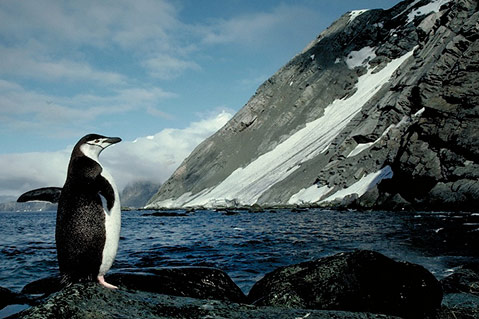The Penguin Counters
Directors Peter Getzels and Harriet Gordon

In addition to being some of the cutest birds on the planet, penguin populations also serve as an indicator of the health of sea life and the effects global warming. In The Penguin Counters, filmmakers Peter Getzels and Harriet Gordon accompany Ron Naveen and his team of research ecologists to the seventh continent to chronicle the arduous task of hand counting tens of thousands of penguins. It’s grueling, tedious work, but their data is some of the most important ecosystem information gathered.
What was the most surprising thing about making this film?
Finding ourselves waist-high in penguin poo on the first day. The stench and the squelch in our boots, well…first days filming are always immersive and this was no exception. Journeying to the ends of the earth was a spectacular experience, standing on deck as we crossed the Antarctic convergence, everything transformed. The temperatures dropped, the seas changed color, even the seabirds seemed different.
When we got to the penguin colonies the overwhelming smell and sound transported us into a new world. The fur seals and sea lions and all types of penguins had no fear — none of them seemed to be bothered by us at all. You could walk quite close but if you did step out of line, you could disturb the fur seals and you wouldn’t want to be on the receiving end of their spiky aggression.
The commitment of people counting tens of thousands of anything in increments of one — in high winds and driving snows — still staggers us. And being in a field amongst 100,000 emperor penguins is like being dropped into a fold of eternity. The penguins are just there. And you wonder, “Is this how it’s been here since the beginning of time? Will these penguins be standing in this same place until the end of time? What goes on in their brains?”
What do you hope audiences take away from your film?
We hope people become engaged with this pristine part of the world. Antarctica is run by a group of nations, so in a sense, it belongs to everyone. Seabirds, especially penguins, are like canaries in the coalmine, they carry the message of how healthy our oceans are and how rapidly our climate is warming, so they’re a very important part of tracking the rapid changes in the environmental story. And Ron is a force of nature. The inspiration of seeing how far his passion has taken him shows how science can be a great adventure, and not always confined to high tech labs. We also loved being able to show a new chapter in the Shackleton story as it unfolded when we were there.
Was it difficult filming under the rough conditions of unpredictable, harsh weather?
PG: The conditions around Deception Island were abominable — gale force winds day after day plus driving snows and sleet. But this is where we were doing our counting, from a 50-foot yacht. At any moment one of our cameras would become frozen or fogged up. I remember pulling the camera out of my rucksack at Vapor Col and the wind just pulled it out of my hands. I had to chase it down the volcanic mountainside. Later that day we had to cross over the top of Deception where the winds were flattening us at 40 to 50 knots, so we had to belly-crawl through the snows.
Penguin colonies are closest to the sea’s edge so ideally we could land the zodiac and do the work. But most days we had to land much farther away because of the wind, so reaching the colonies became a major expedition in itself. Ron called it “Extreme Penguin Counting.”
HG: Meanwhile, I was on board the main ship with another counter, but we sailed into hurricane force winds at the Drake Passage. For nearly a day we were thrashed around and made little progress, with waves crashing over the bow and hitting the bridge, five stories high. At one point the door of the dining room opened where people had been watching a movie and they literally fell out, one after another like dominoes. We scrambled to catch them and I remember just standing there with my arms around a man I barely knew, hoping he’d be all right.
How have audiences responded to the film?
Some people leave glowing in the dark. Most are happy to have spent an afternoon watching a documentary film that makes them feel good. Penguins give people a fuzzy-wuzzy and in today’s world, that’s not a bad thing. Watching a good adventure story with an environmental message that doesn’t hit people over the head or stir guilt — what could be a nicer viewing experience? As Ron says, “The world would be a much sadder place if there weren’t penguins to cheer us up.”



